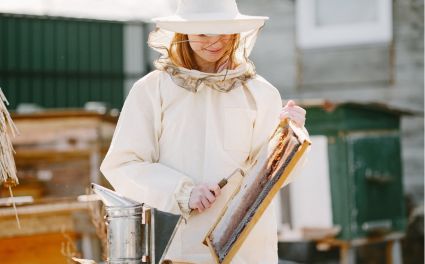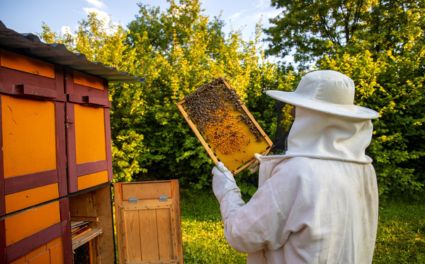Do bees sleep? Researchers have been studying the resting behaviors of pollinators, which has led to interesting discoveries. Recent studies have discovered that bees also have sleep-like states, challenging the belief that sleep is only found in more complex organisms. Understanding the nature and implications of bee sleep not only provides insights into their cognitive capacities and physiological resilience but also underscores the fundamental role of rest in sustaining the intricate dynamics of bee colonies.
Understanding Bee Behavior
Bees are known for being hardworking and organized. Their behaviors change throughout the day and night. Worker bees are busy during the day doing tasks like finding food, helping plants reproduce, taking care of the nest, and looking after the young bees. Bees work hard to gather nectar and pollen from flowers. They do this to provide food for the hive.
The queen bee is currently focused on laying eggs and overseeing the activities of the colony. As the sun sets, bees start to slow down and prepare for rest. They change their behavior to indicate that they are transitioning to a period of rest and recovery. The hive becomes quieter as bees reduce their foraging activities and move less within the nest.
Changes in Bee Behavior during Resting Periods
When bees are resting, their behavior noticeably changes from their usual active tasks. Bees often gather in groups within their hive and move less. Bees reduce the number of foraging trips and become less active as they get ready for a period of rest. During their resting periods, bees clean their bodies and remove foreign particles that have accumulated during the day's activities. Bees often rest together in clusters to keep themselves warm and ensure the well-being of the colony.
Nocturnal Adaptations for Hive Maintenance
Bees have specific adaptations to deal with darkness and keep the hive functioning and safe. Guard bees are responsible for keeping watch at the entrance of the hive to protect it from intruders or predators. Worker bees primarily engage in tasks related to maintaining the nest.
These tasks include repairing and strengthening the honeycomb structures and regulating the temperature inside the hive. Bees engage in nocturnal activities to adapt and protect their hive when there is less activity outside. Studying these behavioral changes helps us learn more about how bee colonies function and their complex social structures.
Also read: How is bee pollen made?
Bee Sleep Patterns
Studies on bee sleep patterns have revealed interesting information about how these important pollinators sleep. Research has shown that bees, similar to other living beings, experience specific periods of rest where they have less physical activity and their brain activity changes.
Studies using electroencephalogram (EEG) have shown that bees have sleep-like states. During these periods, bees have reduced sensory responsiveness and decreased brain activity. This research has discovered how bees sleep and found that their sleep patterns are similar to those seen in more complex animals.
Specific Behaviors Observed during Bee Resting Periods
Bees show certain behaviors similar to sleep during their resting periods. These behaviors refer to bees being less active and not moving much. It is common to see bees staying still for long periods inside the hive. Bees sometimes show a head-down position or stay still in the cells, which means they are entering a resting state. Resting periods are important for bees to rest and recover from their busy tasks of foraging and maintaining their nests. In addition, bees gather together in the hive to regulate temperature and keep the colony healthy during rest periods.
Role of Environmental Factors in Bee Sleep
Environmental factors have a big impact on how bees sleep. Things like temperature, light exposure, and the conditions in their hive can affect how long and how well they rest. Bees can change their sleep patterns based on what's happening around them, which helps them adapt to different environments.
Temperature and light intensity are important factors that affect when bees sleep and how long they sleep. Bees are very sensitive to these environmental cues. Studying how environmental factors affect bee sleep patterns helps us learn about how bees adapt and adjust their rest based on their surroundings.
Also read: Beehive vs. Honeycomb
Physiological Mechanisms of Bee Sleep
The study of bee sleep focuses on understanding the complex neural and physiological processes that occur when bees are resting. Recent research has shown that bees experience distinct changes in brain activity during sleep-like periods. These changes include reduced responsiveness to sensory stimuli and altered neural signaling.
Neural studies have shown that certain areas of the brain have lower activity levels during rest, which suggests that cognitive processes are reduced during these periods. Certain neurotransmitters and neuropeptides seem to affect bee sleep, showing the complex relationship between neurochemical pathways and sleep regulation in bees.
Comparisons with Sleep Mechanisms in Other Insects and Animals
Comparing sleep mechanisms in bees, insects, and other animals highlights the variety and complexity of how sleep is regulated in different species. Bees have sleep patterns that involve reduced physical activity and changes in brain states. However, the neural mechanisms responsible for their sleep are different from those seen in more complex animals. Bees do not have rapid eye movement (REM) sleep like mammals and birds.
Their sleep states are different and not linked to deep sleep stages. There are similarities between how bees and other organisms consolidate memory and learn during sleep. Studying the different ways animals sleep helps us understand how sleep has evolved and why it is important for maintaining physical and mental health in different species. It highlights the important role of sleep in keeping the body and mind in balance.
Significance of Sleep for Bees
Sleep is very important for bees. It helps them with their overall health and how well they can do things. It also helps with their body functions and how they think, which are both really important for their survival and how their colony works. Restful intervals help bees save energy, regulate metabolism, and improve brain functions related to learning and memory.
Sleep helps bees maintain important cognitive functions, which improves their ability to navigate and find food effectively in their complex surroundings. Sleep is important for bees because it helps them recover and stay healthy. It also helps bee colonies adapt to their environment and be productive. This is crucial for their survival in different ecosystems.
Also read: How to enhance honey production?
Implications of Sleep Deprivation on Bee Health and Behavior
Lack of sleep can harm bees' health and behavior. It can cause higher stress problems with thinking and make them less efficient at finding food. Lack of sleep for extended periods can weaken the immune system of bees, making them more vulnerable to diseases and environmental stress. Sleep-deprived bees may show changes in their social behaviors and communication within the colony.
This can disrupt the important balance and coordination needed to keep the colony functioning properly. Sleep deprivation has negative effects on bee health. Bees need to get enough rest in order to support their overall well-being and ecological contributions as pollinators.
Final Thoughts
In conclusion, the growing body of research indicates that bees indeed undergo sleep-like states characterized by reduced activity and altered brain patterns, emphasizing the significance of rest in their complex behavioral and physiological dynamics.
Studying how bees sleep, and the neural mechanisms involved helps us learn about their evolutionary adaptations and the importance of sleep for their cognitive functions, energy conservation, and overall well-being. Understanding the impact of sleep on bee health and behavior highlights the need to create environments that promote their natural rest and recovery. This is crucial for maintaining bee populations and overall ecological balance.



